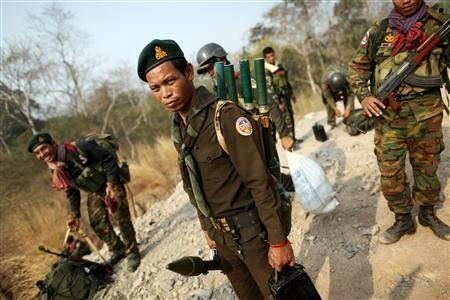Uneasy peace holds after Thai, Cambodian troops clash

Thai and Cambodian troops stood on high alert on Tuesday after clashing in disputed jungle around a 11th-century Hindu temple as foreign governments urged them to lay down arms.
Soldiers on both sides of the border held fire but dug in positions, bracing for more fighting after four days of clashes in the 4.6-sq-km (two-sq-mile) contested area around the Preah Vihear temple claimed by the Southeast Asian neighbours.
Following pressure by China, the ASEAN Southeast Asian regional grouping and Washington on both countries to show restraint, the Thai government said it was ready to hold talks with Cambodia on resolving the dispute.
Thai Foreign Minister Kasit Piromya said he planned to meet Cambodia's foreign minister soon in a third country to discuss how to end the fighting, the fiercest since the early 1990s, when Cambodia's Khmer Rouge forces operated in the area.
That followed the U.N. Security Council's rejection of Cambodian Prime Minister Hun Sen's call for an urgent council meeting. Council president Maria Luiza Ribeiro Viotti said the problem should be solved at a regional level.
The Association of South East Asian Nations (ASEAN), of which Cambodia and Thailand are members, urged the two countries to enter into talks, possibly with ASEAN's help.
The issue must be addressed and can only be addressed bilaterally because this is a border issue that needs to be negotiated between them, Indonesian Foreign Minister Marty Natalegawa, current ASEAN chairman, said in Bangkok.
But at the same time, there is always space for ASEAN, and members of ASEAN, to support the bilateral efforts.
Thailand and Cambodia blame each other for provoking intense exchanges of fire that killed at least three Thais and eight Cambodians and energised ultra-nationalist Thai yellow shirt protesters who are demanding Thailand's government step down.
In Cambodia's Preah Vihear province, soldiers allowed some reporters through military checkpoints near the 900-year-old clifftop temple.
Felled trees, small craters and blackened remnants of fires told a story of fierce fighting around the temple, which sustained only minor damage from grenades fired from over the border.
The United Nations body in charge of preserving historical sites (UNESCO) will send a mission to the area to assess the temple's state, its director Irina Bokova said.
Cambodia's government accused Thai soldiers of causing a wing of the temple to collapse, but there was no visible evidence of such damage when Reuters reporters visited the site.
A LOT OF UNCERTAINTY'
Cambodian soldiers said there was no sign of fighting since early Monday but the situation remained tense.
We're ready because we can't trust the Thais anymore, said Muong Van, an infantry soldier.
In Cambodia's northern frontier areas, pigs and chickens roamed deserted villages. Schools and temples were turned into makeshift refugee centres.
On the Thai side, villages such as Ban Sangam in Si Sa Ket province about 7 km (4 miles) from the border were eerily quiet, aside from the occasional rumble of military trucks.
Somsak Suvarnsujarit, governor of Si Sa Ket province, said 16,654 people had been evacuated.
There is still a lot of uncertainty and we will only let people move back into villages when there is a clear sign from the army that situation has returned to normal, he said.
The Thai government said 30 Thai soldiers and 4 villagers had been wounded so far. At least 55 Cambodians have been wounded, according to figures provided by Cambodia's government.
Reasons behind the fighting remain murky. Some analysts say hawkish Thai generals and nationalist allies may be trying to topple Thailand's government or create a pretext to stage another coup and cancel elections expected this year.
Others say it may be a breakdown in communication channels at a time of strained relations over Cambodia's flying of a national flag in the disputed area and laying of a stone tablet inscribed with This is Cambodia.
The dispute threatens to worsen hostility between Thai political factions ahead of this year's expected election.
The Yellow Shirts protesters, whose rallies helped bring Abhisit to power, have turned against him in recent weeks, calling for a tougher line against Cambodia.
In 2008, they occupied state offices for three months and blockaded Bangkok's main airport until a court expelled a government allied with former Prime Minister Thaksin Shinawatra, a step that led to Abhisit taking power.
The Thai cabinet on Tuesday imposed the Internal Security Act so security forces could contain planned protests in Bangkok.
(Additional reporting by Prapan Chankaew in Ban
© Copyright Thomson Reuters 2024. All rights reserved.





















